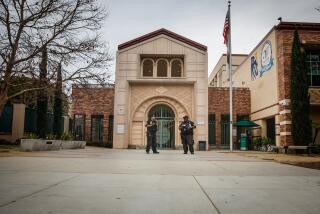Hazing Is Thriving in High Schools Too, Study Shows
- Share via
WASHINGTON — Hazing, a practice that has ignited controversy on college campuses across the country, is thriving in high schools too, a study released Monday warned.
In the first-ever effort to measure the sometimes silly, often cruel and occasionally dangerous rites of passage among high school students, researchers have found that, of those who join groups--from athletic teams to youth organizations at church--almost half say they have been subjected to initiation rituals that could be characterized as hazing.
And in a finding with potentially ominous implications for school violence, almost three-quarters of those students reported that negative consequences followed--from fights with parents and trouble with the law to feelings of depression, vengefulness and shame. Almost every type of high school group whose members the study polled had significant levels of hazing. Even among students involved in church groups, 24% said that they had been subjected to some form of hazing.
“High school represents a time in young persons’ lives where they’re trying to develop an identity, to develop self-esteem,” said Norman J. Pollard, a professor at Alfred University in New York and one of the study’s investigators. “This study shows that they’re being hit between the eyes with really negative things and their response is really torment, really revenge. As a mental health professional, it worries me.”
The researchers involved in the study were building upon an earlier Alfred University study of hazing among college athletes. That study, conducted among National Collegiate Athletic Assn. member schools across the country, found that 80% of college athletes engaged in hazing activities. That study’s finding that 47% reported having been hazed in middle or secondary school prompted this year’s survey of high schoolers.
In the current survey, researchers compiled the responses of 1,500 high school students to a survey mailed to them. Those who participated made up a representative cross-section of the nation’s high schoolers on ethnic, gender and geographical lines.
Hazings, according to the study’s authors, could include “any humiliating or dangerous activity” expected of someone seeking to join a group, regardless of the individual’s willingness to participate. Hazing can range from sneaking cigarettes and shoplifting to engaging in sex with or enduring abusive treatment meted out by group members.
To some researchers’ surprise, 31% of those who described being hazed viewed it as a positive thing, suggesting to Pollard that--for the fragile egos of adolescents--”it’s better to be degraded and humiliated than to be on the outs.”
Since 1973, 56 college students have died in reported hazing and initiation-related incidents, said Hank Nuwer, author of “Broken Pledges,” a book about hazing. While high school hazings appear to have claimed no lives, Nuwer has counted at least 16 reports of hazing-related sodomy and sexual assaults involving high school students since he began tracking them in 1983.
And, according to the study, nearly one-fourth of high school hazings involve substance abuse, the most common cause of death in college hazings.
Nuwer, an Indiana University journalism professor, sees the study’s findings as “a red light on the dashboard rather than a collision: It’s a warning signal that needs to be heeded.”
Colleges have awakened to the problem of hazing and are adopting a wide range of educational programs and disciplinary measures, Nuwer said. But “educational programs at the high school level are seriously lacking.”
The nationwide study reflected recent incidents of hazing at several Southern California schools. At Glendale High School last spring, eight members of the football team were suspended after a hazing ritual came to light in which older players pinned younger ones to the floor and poked at them with a broom handle. At Westlake High School in Ventura County, hazings involving members of the school’s wrestling team prompted school officials there to suspend the squad’s 1998 season.
At St. Genevieve High School, a Catholic school in Panorama City, Monday’s report came as no surprise to Principal Dan Horn.
“High school very often can be a very unfriendly place,” Horn said. “It’s almost set up so that it’s accepted by parents, students, teachers and administrators that students are going to be hazed at school--that it’s a rite of passage. And it’s time to change.”
Horn said he found that incoming freshmen were frequently taunted and humiliated by upperclassmen. Seeking to reverse that situation, Horn has rallied all the school’s seniors to welcome freshmen personally, with banners, songs, personal notes and ongoing partnerships. The effect, he said, has been immediate and remarkable.







